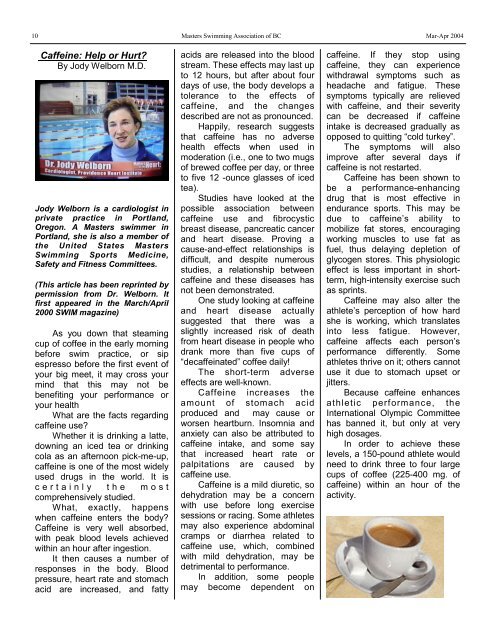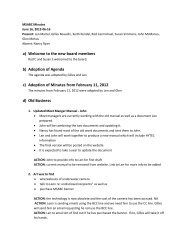Great Lengths - Masters Swimming Association of British Columbia
Great Lengths - Masters Swimming Association of British Columbia
Great Lengths - Masters Swimming Association of British Columbia
You also want an ePaper? Increase the reach of your titles
YUMPU automatically turns print PDFs into web optimized ePapers that Google loves.
10 <strong>Masters</strong> <strong>Swimming</strong> <strong>Association</strong> <strong>of</strong> BC<br />
Mar-Apr 2004<br />
Caffeine: Help or Hurt?<br />
By Jody Welborn M.D.<br />
Jody Welborn is a cardiologist in<br />
private practice in Portland,<br />
Oregon. A <strong>Masters</strong> swimmer in<br />
Portland, she is also a member <strong>of</strong><br />
the United States <strong>Masters</strong><br />
<strong>Swimming</strong> Sports Medicine,<br />
Safety and Fitness Committees.<br />
(This article has been reprinted by<br />
permission from Dr. Welborn. It<br />
first appeared in the March/April<br />
2000 SWIM magazine)<br />
As you down that steaming<br />
cup <strong>of</strong> c<strong>of</strong>fee in the early morning<br />
before swim practice, or sip<br />
espresso before the first event <strong>of</strong><br />
your big meet, it may cross your<br />
mind that this may not be<br />
benefiting your performance or<br />
your health<br />
What are the facts regarding<br />
caffeine use?<br />
Whether it is drinking a latte,<br />
downing an iced tea or drinking<br />
cola as an afternoon pick-me-up,<br />
caffeine is one <strong>of</strong> the most widely<br />
used drugs in the world. It is<br />
certainly the most<br />
comprehensively studied.<br />
What, exactly, happens<br />
when caffeine enters the body?<br />
Caffeine is very well absorbed,<br />
with peak blood levels achieved<br />
within an hour after ingestion.<br />
It then causes a number <strong>of</strong><br />
responses in the body. Blood<br />
pressure, heart rate and stomach<br />
acid are increased, and fatty<br />
acids are released into the blood<br />
stream. These effects may last up<br />
to 12 hours, but after about four<br />
days <strong>of</strong> use, the body develops a<br />
tolerance to the effects <strong>of</strong><br />
caffeine, and the changes<br />
described are not as pronounced.<br />
Happily, research suggests<br />
that caffeine has no adverse<br />
health effects when used in<br />
moderation (i.e., one to two mugs<br />
<strong>of</strong> brewed c<strong>of</strong>fee per day, or three<br />
to five 12 -ounce glasses <strong>of</strong> iced<br />
tea).<br />
Studies have looked at the<br />
possible association between<br />
caffeine use and fibrocystic<br />
breast disease, pancreatic cancer<br />
and heart disease. Proving a<br />
cause-and-effect relationships is<br />
difficult, and despite numerous<br />
studies, a relationship between<br />
caffeine and these diseases has<br />
not been demonstrated.<br />
One study looking at caffeine<br />
and heart disease actually<br />
suggested that there was a<br />
slightly increased risk <strong>of</strong> death<br />
from heart disease in people who<br />
drank more than five cups <strong>of</strong><br />
“decaffeinated” c<strong>of</strong>fee daily!<br />
The short-term adverse<br />
effects are well-known.<br />
Caffeine increases the<br />
amount <strong>of</strong> stomach acid<br />
produced and may cause or<br />
worsen heartburn. Insomnia and<br />
anxiety can also be attributed to<br />
caffeine intake, and some say<br />
that increased heart rate or<br />
palpitations are caused by<br />
caffeine use.<br />
Caffeine is a mild diuretic, so<br />
dehydration may be a concern<br />
with use before long exercise<br />
sessions or racing. Some athletes<br />
may also experience abdominal<br />
cramps or diarrhea related to<br />
caffeine use, which, combined<br />
with mild dehydration, may be<br />
detrimental to performance.<br />
In addition, some people<br />
may become dependent on<br />
caffeine. If they stop using<br />
caffeine, they can experience<br />
withdrawal symptoms such as<br />
headache and fatigue. These<br />
symptoms typically are relieved<br />
with caffeine, and their severity<br />
can be decreased if caffeine<br />
intake is decreased gradually as<br />
opposed to quitting “cold turkey”.<br />
The symptoms will also<br />
improve after several days if<br />
caffeine is not restarted.<br />
Caffeine has been shown to<br />
be a performance-enhancing<br />
drug that is most effective in<br />
endurance sports. This may be<br />
due to caffeine’s ability to<br />
mobilize fat stores, encouraging<br />
working muscles to use fat as<br />
fuel, thus delaying depletion <strong>of</strong><br />
glycogen stores. This physiologic<br />
effect is less important in shortterm,<br />
high-intensity exercise such<br />
as sprints.<br />
Caffeine may also alter the<br />
athlete’s perception <strong>of</strong> how hard<br />
she is working, which translates<br />
into less fatigue. However,<br />
caffeine affects each person’s<br />
performance differently. Some<br />
athletes thrive on it; others cannot<br />
use it due to stomach upset or<br />
jitters.<br />
Because caffeine enhances<br />
athletic performance, the<br />
International Olympic Committee<br />
has banned it, but only at very<br />
high dosages.<br />
In order to achieve these<br />
levels, a 150-pound athlete would<br />
need to drink three to four large<br />
cups <strong>of</strong> c<strong>of</strong>fee (225-400 mg. <strong>of</strong><br />
caffeine) within an hour <strong>of</strong> the<br />
activity.










